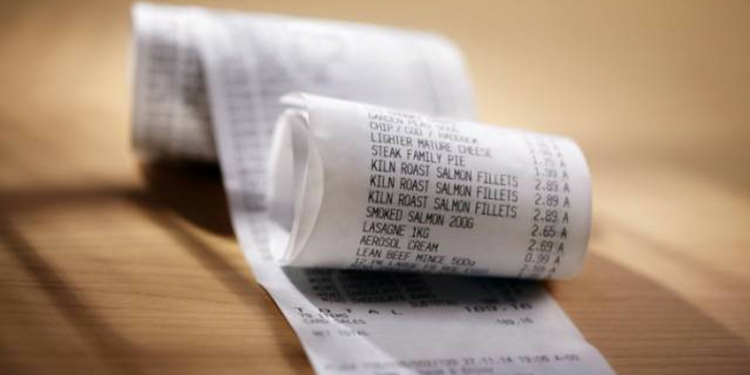According to experts, up to 90 per cent of receipts contain cancer-causing chemicals.
Receipts which use ink that fade over time are made with ‘thermal paper’ which contains BPA (bisphenolA).
Studies have shown the chemical can lead to hormone-dependent cancers, and has previously been linked to infertility, autism, ADHD, obesity, type 2 diabetes, premature births and early onset of puberty.
There are already concerns about the public being exposed to BPA, which is often found in plastics.
BPA is added to receipts to make their writing darker without using ink, and is also found in plastic water bottles and food containers.
International researchers, led by the University of Granada, analysed 112 thermal paper receipts and tickets from Brazil, Spain and France.
”We can recognize this kind of paper because it instantly turns black if we put it close to a heat source like, for example, a match,” Professor Olea from the University of Granada said.
The French government has taken action to the reduction of the use of that chemical compound in thermal paper since 2014 and researchers have warned the public about being more careful when handling receipts.
”For example, tickets should not get in contact with food – for instance, meat or fish – while unpacking it in the kitchen,” Professor Olea said. ”Moreover, we should not crumple the tickets to throw them in the trash, play with them, write notes on them, or store them in cars, purses or handbags. In short, we should manipulate this kind of tickets as little as possible.
They are easily identified by the customer since they are those receipts that, after some time, lose what they have printed on them and, when you are going to return the trousers you bought, the cashiers tell you that they cannot see anything.
Very often, the only thing you find is a fine white powder that comes off when taking them out of the handbag or purse. BPA is, precisely, that white powder that sticks to your fingers.”
Scientists have sought alternatives to gradually replace BPA in an array of items.BPS was designed as a replacement after mounting concerns over the plastic compound’s effect on human health. However, scientists aren’t on board with this chemical either, believing that BPS is also a hormone disruptor.
Those most at risk appear to those working in the retail and hospitality field as research reveals cashiers and waiting staff can handle as many as 30 receipts an hour, and after a shift, have significantly higher BPA and BPS levels in their blood and urine than the average person.
How to reduce your BPA and BPS receipt exposure?
More than 90 percent of receipts contain BPA, research in January 2018 from the Michigan-based non-profit organisation The Ecology Center found.
The researchers recommend people reduce their BPA or BPS receipt exposure by:
- Choosing electronic receipts if available
- Folding receipts so the printed side is facing inwards. The back is not typically coated in chemicals
- Keeping an envelope in their wallets to place receipts. This avoids them rubbing against money
- Not handing receipts to children
- Washing their hands after touching receipts
- Disposing of receipts in the trash over recycling to avoid contaminating recycled paper
- Cashiers should only print receipts when asked, wear gloves, wash their hands thoroughly and avoid touching their mouths






Discussion about this post